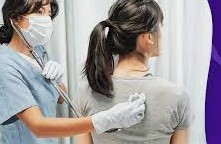Introduction:
Pneumonia can occur in any season, including summer. While it’s more commonly associated with colder months. Pneumonia can occur in summer due to factors like temperature changes, increased exposure to air conditioning, and higher humidity levels.
These conditions can create an environment where bacteria or viruses thrive, leading to respiratory infections. people get pneumonia in summer also so it does not happen only in winter. It’s important to take preventive measures like staying hydrated, practicing good hygiene, and avoiding close contact with sick individuals. Stay healthy and enjoy the summer while taking care of your respiratory health.
why do people get pneumonia in the summer?
Summer Travel:
When it comes to summer travel and pneumonia, it’s important to be aware of the potential risks. Traveling exposes us to different environments and people, increasing the chances of coming into contact with respiratory infections. To minimize the risk, make sure to practice good hygiene, such as washing hands frequently, avoiding close contact with sick individuals, and considering getting vaccinated before traveling.
Summer Allergies:
Summer allergies can sometimes lead to complications such as pneumonia. Allergies can weaken the immune system and make individuals more susceptible to respiratory infections. It’s important to manage allergies effectively, such as by taking allergy medication, avoiding triggers, and maintaining good respiratory hygiene. If you experience symptoms that worsen or persist, it’s best to consult a healthcare professional. Stay proactive in managing your allergies and have a healthy summer.
Waterborne Infections:
Waterborne infections, such as Legionnaires’ disease, can sometimes lead to pneumonia. It’s important to be cautious when exposed to contaminated water sources, such as hot tubs, cooling towers, or poorly maintained plumbing systems. To reduce the risk, make sure to follow proper water safety guidelines, such as avoiding stagnant water and ensuring proper disinfection. If you experience symptoms like cough, fever, or difficulty breathing after exposure to water sources, seek medical attention promptly. Stay informed and take necessary precautions to protect your health.
Seasonal Factors:
Seasonal factors can contribute to an increased risk of pneumonia. During colder months, people tend to spend more time indoors, increasing the chances of close contact and the spread of respiratory infections. It’s important to stay vigilant and practice good respiratory hygiene, such as washing hands frequently and covering your mouth and nose when coughing or sneezing. If you experience symptoms like persistent cough, chest pain, or difficulty breathing, it’s important to seek medical attention.
Air Conditioning and Temperature Changes:
Air conditioning temperature changes can potentially contribute to the risk of pneumonia. Rapid shifts in temperature, especially when going from a hot outdoor environment to a cold indoor environment, can strain the respiratory system and make individuals more susceptible to respiratory infections. It’s important to maintain a comfortable temperature and avoid extreme temperature changes. Additionally, practicing good respiratory hygiene, such as washing hands regularly and avoiding close contact with sick individuals, can help reduce the risk of pneumonia. Stay cozy and take care of your respiratory health.
Increased Outdoor Activities:
Increased outdoor activities can sometimes increase the risk of pneumonia, especially during colder months. When spending time outside, it’s important to dress appropriately to stay warm and protect your respiratory system. Additionally, practicing good respiratory hygiene, such as washing hands frequently and avoiding close contact with sick individuals, can help reduce the risk of pneumonia.
Heat-Related Illnesses and Pneumonia:
Heat-related illnesses and pneumonia are different conditions that affect the body in distinct ways. Heat-related illnesses, such as heat exhaustion or heatstroke, occur when the body overheats due to exposure to high temperatures. On the other hand, pneumonia is an infection that primarily affects the lungs. While both conditions can be serious, they have different causes and require different treatment approaches. It’s important to stay hydrated and take necessary precautions to prevent heat-related illnesses during hot weather, while also practicing good respiratory hygiene to reduce the risk of pneumonia.
Summer Camps:
Summer camps can be a fun and exciting experience for children, but it’s important to be aware of health risks, including pneumonia. Close contact and shared living spaces can increase the spread of respiratory infections. To reduce the risk, encourage good hygiene practices like handwashing and covering coughs and sneezes. It’s also important to ensure proper ventilation and cleanliness in camp facilities. Stay informed and take necessary precautions to keep everyone healthy at summer camp.
Prevention Measures:
Practice good respiratory hygiene by covering your mouth and nose when coughing or sneezing.
Wash your hands frequently with soap and water to prevent the spread of germs.
Stay hydrated and maintain a healthy lifestyle to support your immune system.
Avoid close contact with sick individuals and crowded places.
Keep your living spaces clean and well-ventilated to reduce the risk of respiratory infections.
conclusion
in this topic, we explained pneumonia and most people get pneumonia in summer so it does not happen only in winter.
If you want to know more about this topic; link 1
another one ; link 2

This was beautiful Admin. Thank you for your reflections.
Real Estate I very delighted to find this internet site on bing, just what I was searching for as well saved to fav